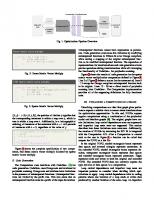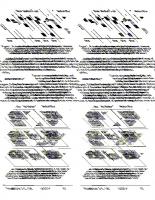An Object-Oriented Interface to The Sparse Polyhedral Library 9781665424639
Published in Proceedings of 2021 IEEE 45th Annual Computers, Software, and Applications Conference. Abstract: Many impo
199 42 347KB
English Pages 1825-1831 [7] Year 2021
Introduction
Computation: A C++ Class
Data Spaces
Statements
Data Dependence Relationships
Execution Schedules
Code Generation
Visualizing a Computation on a Graph
Loop Carried Dependences
Imperfect loop nests
Dot File Graph
Operations on Computations
Inlining
Loop Transformations as Graph Operations
Fusion
Reschedule
Related Work
Polyhedral Model Tools
Program Dependence Graphs
Sparse Polyhedral Model Tools
Conclusion
References
Recommend Papers

- Author / Uploaded
- Tobi Popoola
- Ravi Shankar
- Anna Rift
- Shivani Singh
- Eddie C. Davis
- Michelle Mills Strout
- Catherine Olschanowsky
- Similar Topics
- Computers
- Programming: Compilers
File loading please wait...
Citation preview
An Object-Oriented Interface to The Sparse Polyhedral Library Tobi Popoola1 Ravi Shankar2 Anna Rift3 Shivani Singh4 Eddie C. Davis5 Michelle Mills Strout6 and Catherine Olschanowsky7 1,2,3,4,7 Department
Email:
{1 tobipopoola
of Computer Science, Boise State University, Boise USA | | | 4 shivanisingh}@u.boisestate.edu, 7 [email protected] 5 Vulcan Inc., Seattle, USA Email: [email protected] 6 Department of Computer Science, University of Arizona, Tucson, USA Email: [email protected] 2 ravishankar
3 annarift
Abstract—Many important applications including machine learning, molecular dynamics, and computational fluid dynamics, use sparse data. Processing sparse data leads to non-affine loop bounds and frustrates the use of the polyhedral model for code transformation. The Sparse Polyhedral Framework (SPF) addresses limitations of the Polyhedral model by supporting non-affine constraints in sets and relations using uninterpreted functions. This work contributes an object-oriented API that wraps the SPF intermediate representation (IR) and integrates the Inspector/Executor Generation Library and Omega+ for precise set and relation manipulation and code generation. The result is a well-specified definition of a full computation using the SPF IR. The API provides a single entry point for tools to interact with the SPF, generate and manipulate polyhedral data flow graphs, and transform sparse applications. Index Terms—computation api, intermediate representation, sparse polyhedral framework, polyhedral dataflow graph
I. I NTRODUCTION Many important applications including machine learning, molecular dynamics and computational fluid dynamics use sparse data. To save memory, sparse data is often compressed by storing only the non-zero values. Index arrays are used to map the non-zero value back to their coordinates in the dense space. The index arrays are used in loop bounds while iterating over the sparse data. These non-affine loop bounds complicate the use of compiler transformation for performance optimization. The polyhedral model is an effective optimization tool for applications with affine loop bounds. This model represents computations as sets and relations. Iteration spaces are represented with sets and data dependences are represented using relations. This combination of iteration spaces and data dependences provides a partial ordering for the target computation. Within the partial ordering, the order of execution can be altered by applying relations to the iteration space. These relations are referred to as transformations. A limitation to the polyhedral model is that the constraints within iteration spaces and transformations must be affine. The sparse polyhedral framework extends the polyhedral model by supporting non-affine iteration spaces and transformations using uninterpreted functions. Uninterpreted functions
are symbolic constants that represent data structures such as the index arrays in sparse data formats. The SPF provides much of the same functionality as traditional polyhedral tools: code generation with CodeGen+ [1] built on Omega [2] and precise set and relation operations in the presence of uninterpreted functions with IEGenLib [3]. However, these tools are not tightly integrated and each has their own lowlevel API to interact with individual components. The contribution of this work is the Computation API. The Computation API provides a precise specification of how to combine the individual components of the SPF to create an intermediate representation. This IR can directly produce Polyhedral Dataflow Graphs (PDFGs) [4] and translates graph operations defined for PDFGs into relations used by IEGenLib to perform transformations. In this work, we extend the PDFG representation to handle non-affine loops with imperfect nesting and loop carried dependences. Figure 1 shows an overview of our optimization framework and where the computation API fits in the process. Spfie highlighted grey in the figure is a tool that automates translation from source code to our API and is currently under development. In this work we focus on manually translating original source code to the computation IR. The computation IR by itself supports composable transformations by virtue of the sparse polyhedral framework. Graph operations on a PDFG generates composable transformations and are applied to statements in the IR. Our work overcomes limitations of previous approaches through a tight integration among CodeGen+, Omega, and IEGenLib. CHiLL [5] provides a script based interface for the SPF and supports non-affine transformations by using Omega. Omega has limitations on the precision of operations involving uninterpreted functions, as well as restrictions on how they must be expressed. Our computation API depends on IEGenLib [3] for set and relation operations, thereby overcoming the precision limitations. The contributions of this paper include: • A unified standard interface to specify a computation in the SPF • Integration with PDFGs
• • • • •
Extensions to PDFGs to support non-affine loop bounds, imperfectly nested loops, and loop carried dependences Translations between PDFG operations and SPF relations Integration between CodeGen+ and IEGenLib Support for inlining computations Peripheral support for generated code II. C OMPUTATION : A C++ C LASS
The interface to the SPF is implemented as a C++ class in IEGenLib. The computation class contains all of the information required to express a computation or a series of computations. This includes: data spaces, statements, data dependences, and execution schedules. This section describes the design and interface for each of these elements. Matrix vector multiplication is used as a running example throughout the rest of this paper. Figures 2 & 3 show the dense and sparse versions. A. Data Spaces A data space represents a collection of conceptually unique memory addresses. A data space of 0 dimensions is equivalent to a scalar. Each combination of data space name and input tuple is guaranteed to map to a unique space in memory for the lifetime of the data space. For example, D(⃗s), guarantees that for each unique tuple ⃗s there will be a unique memory location, and that during the lifetime of D its memory locations will not overlap with any other live data space’s memory locations. By default all data spaces are generic. They are used with the syntax D(⃗s). For example, for a 3 parameter input tuple i, j, k the data space can be represented as D(i, j, k). This data space can be written to only once but read from any number of times. The exception to this rule is for accumulation operations when a single data location within a data space can be written to multiple times (+ =, − =, ∗ =, max, min...). The data spaces represented in the matrix vector multiply example in are y, A, and x. In the sparse version the index arrays rowptr and col are also considered data spaces. However, since they are used within the loop bounds and to access into another data space they must be constant for the duration of this computation. Therefore, they are not required as part of the Computation’s definition.
All statements have an iteration domain associated with them. This iteration domain is a set containing every instance of the statement and has no particular order. It is typically expressed as the set of iterators that the statement runs over, subject to the constraints of their iteration (loop bounds). The following code block shows how to create a statement using the Computation API. A statement is written as a string and the names of the data spaces are delimited with $ symbols, this can be seen on lines 2 and 5 below for the dense and sparse cases respectively. The iteration domain is specified as a set using the IEGenLib syntax, with the exception of delimiting all data spaces with $, this can be seen on lines 3 and 6 below. 1 2 3 4 5 6 7
2 3 4 5
// dense Computation* dsComp = new Computation(); dsComp->addDataSpace("$y$"); dsComp->addDataSpace("$A$"); dsComp->addDataSpace("$x$");
Stmt* sps0 = new Stmt( "$y$(i) += $A$(k) * $x$(j)", "{[i,k,j]: 0 [i,j]}"}, {"x", "{[i,j]->[j]}"} }, { // writes {"y", "{[i,j]->[i]}"} }
19 20 21 22 23 24 25
1
Stmt* ds0 = new Stmt( "$y$(i) += $A$(i,j) * $x$(j);", "{[i,j]: 0 [k]}"}, {"x", "{[i,k,j]->[j]}"} }, { // writes {"y", "{[i,k,j]->[i]}"} }
6 7 8 9 10 11
// sparse Computation* spsComp = new Computation(); spsComp->addDataSpace("$y$"); spsComp->addDataSpace("$A$"); spsComp->addDataSpace("$x$");
B. Statements Statements perform read and write operations on data spaces. We restrict the definition of statements to be basic blocks. There is a single entry and a single exit from each block of code represented.
D. Execution Schedules Execution schedules are determined using scattering functions that are required to respect the data dependence relations. Scheduling functions take as input the iterators that apply to the current statement, if any, and output the schedule as an integer tuple that may be lexicographically ordered with others to determine correct execution order of a group of statements. Iterators are commonly used as part of the output tuple, representing that the value of iterators affects the ordering of the statement. For example, in the scheduling function
Fig. 1: Optimization Pipeline Overview
Dense matrix vector multiply 1 2 3 4 5
for (i = 0; i < N; i++) { for (j=0; jaddDataSpace("$y$"); dsComp->addDataSpace("$A$"); dsComp->addDataSpace("$x$");
3
2
3 4 5 6 7 8 9 10 11 12 13 14 15 16 17 18 19 20 21 22 23 24 25
28
31 32 33
6
8 9 10
11 12 13
15 16
17 18 19 20
23 24
26 27
36 37
38 39 40 41 42 43 44 45 46 47 48
Stmt* sps0 = new Stmt( "$y$(i) += $A$(k) * $x$(j)", "{[i,k,j]: 0 [i]}"}, {"A", "{[i,k,j]->[k]}"}, {"x", "{[i,k,j]->[j]}"} }, { {"y", "{[i,k,j]->[i]}"} } ); spsComp->addStmt(sps0);
Fig. 4: Computation API specification for dense and sparse matrix vector multiply
loop nest is one that has statements at multiple levels as shown in Figure 6.
for(t2 = 0; t2 addDataSpace("$A$"); spsComp->addDataSpace("$x$");
y
14
22
// sparse mvm Computation* spsComp = new Computation();
29 30
5
7
Stmt* ds0 = new Stmt( // source code "$y$(i) += $A$(i,j) * $x$(j);", // iter domain "{[i,j]: 0 [i]}"}, {"A", "{[i,j]->[i,j]}"}, {"x", "{[i,j]->[j]}"} }, { // data writes {"y", "{[i,j]->[i]}"} } ); dsComp->addStmt(ds0);
26 27
4
#undef s0 #define s0(__x0, i, __x2, k, __x4, j, __x6) (i) += A(k) * x(j)
The forward solve example code 1 2 3 4 5 6 7
for (i=0; i









![The essential guide to user interface design: an introduction to GUI design principles and techniques [3 ed.]
0470053429, 9780470053423](https://ebin.pub/img/200x200/the-essential-guide-to-user-interface-design-an-introduction-to-gui-design-principles-and-techniques-3nbsped-0470053429-9780470053423.jpg)